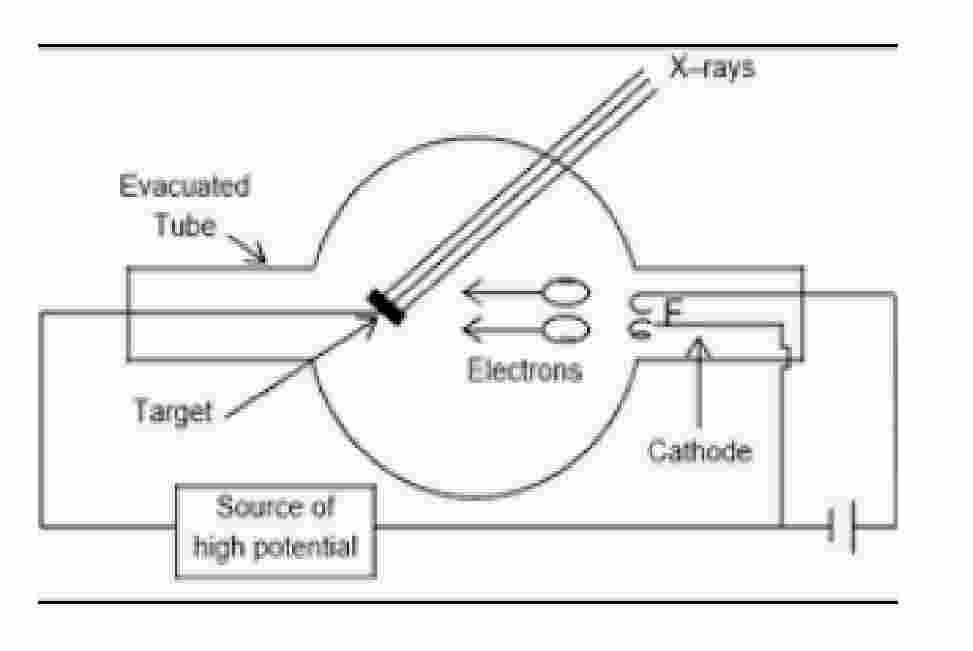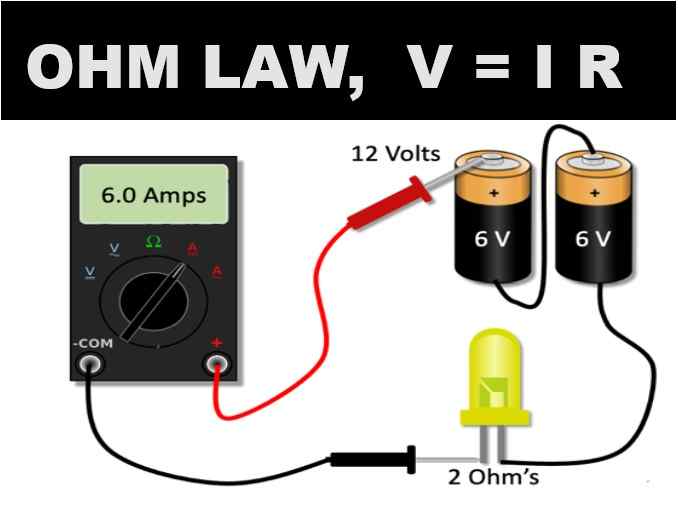X- Rays MCQs Type Questions with Answer for ISC Class 12 . These MCQs / Objective Type Questions is based on latest reduced syllabus according 2021-22 session on bifurcated pattern. Main motto of MCQ Type Question is cracking the next upcoming Sem-2 exam of council. Visit official website CISCE for detail information about ISC Class-12 Physics.
ISC Class 12 X- Rays MCQs Type Questions with Answer

| Board | ISC |
| Class | 12th (XII) |
| Subject | Physics |
| Chapter | X- Rays |
| Syllabus | on bifurcated syllabus (after reduction) |
| Session | 2021-22 |
| Bifurcated | Sem-2 |
| Topic | MCQs / Objective Type Question |
MCQs X- Rays for ISC Class 12 Physics
Question 1: What is the minimum X-ray wavelength produced when electrons are accelerated through a potential of 50000 V? (h = 6.63 × 10-34 J s, c = 3 × 108 m/s, 1 eV = 1.6 × 10-19 J)
(a) 35.8 × 10-12 m
(b) 68.3 × 10-12 m
(c) 19.6 × 10-12 m
(d) 24.9 × 10-12 m
Answer: (d) 24.9 × 10-12 m
Question 2: X-rays when incident on a metal
(a) Exert a force on it
(b) Transfer energy to it
(c) Transfer pressure to it
(d) All of the above
Answer. (d) All of the above
Question 3: The longest wavelength X-ray that can undergo Bragg diffraction in a crystal for a given family of planes of spacing d is
(a) d/4
(b) d/2
(c) d
(d) 2d
Answer: (d) 2d
Question 4: If the voltage of X-ray tube is doubled, the intensity of X-rays will become
(a) Half
(b) Unchanged
(c) Double
(d) Four times
Answer. (b) Unchanged
Question 5: X-rays cannot be deflected by means of an ordinary grating due t
(a) Large wavelength
(b) High speed
(c) Short wavelength
(d) None of these
Answer. (c) Short wavelength
Question 6: In X-ray emission tubes, X-ray is emitted by the acceleration of ____
(a) Atoms
(b) Protons
(c) Electrons
(d) Neutrons
Answer. (c) Electrons
Question 7: X–rays which can penetrate through longer distances in substance are called
(a) Soft X-rays
(b) Continuous X-rays
(c) Hard X-rays
(d) None of the above
Answer. (c) Hard X-rays
Question 8: The wavelength range of X-rays is __
(a) 1 mm to 700 nm
(b) 400 nm to 1 nm
(c) 1 nm to 0.001 nm
(d) 0.1 m to 1 mm
Answer. (c) 1 nm to 0.001 nm
Question 9: On increasing the number of electrons striking the anode of an X-ray tube, which one of the following parameters of the resulting X-rays would increase
(a) Penetration power
(b) Frequency
(c) Wavelength
(d) Intensity
Answer. (d) Intensity
Question 10: The X-ray beam coming from an X-ray tube will be
(a) Monochromatic
(b) Having all wavelengths smaller than a certain maximum wavelength
(c) Having all wavelengths larger than a certain minimum wavelength
(d) Having all wavelengths lying between a minimum and a maximum wavelength
Answer. (c) Having all wavelengths larger than a certain minimum wavelength
Question 11: X-rays are weightless.
(a) True
(b) False
Answer. (a) True
Question 12: For harder X-rays
(a) The wavelength is higher
(b) The intensity is higher
(c) The frequency is higher
(d) The photon energy is lower
Answer. (c) The frequency is higher
Question 13: X–rays region lies between
(a) Short radiowave and visible region
(b) Visible and ultraviolet region
(c) Gamma rays and ultraviolet region
(d) Short radiowave and long radiowave
Answer. (c) Gamma rays and ultraviolet region
Question 14: In free space, X-ray travels in _______
(a) Periodic oscillations
(b) Non-Periodic oscillations
(c) Zig-zag path
(d) Straight line
Answer. (d) Straight line
Question 15: X-rays and gamma rays are both electromagnetic waves. Which of the following statements is true
(a) In general X-rays have larger wavelength than of gamma rays
(b) X-rays have smaller wavelength than that of gamma rays
(c) Gamma rays have smaller frequency than that of X-rays
(d) Wavelength and frequency of X-rays are both larger than that of gamma rays
Answer. (a) In general X-rays have larger wavelength than of gamma rays
Question 16: X-rays are used with computer in __
(a) CT Scan
(b) CAT Scan
(c) CA Scan
(d) AT Scan
Answer: (b) CAT Scan
Question 17: The penetrating power of X-rays increases with the
(a) Increase in its velocity
(b) Increase in its frequency
(c) Increase in its intensity
(d) Decrease in its velocity
Answer. (b) Increase in its frequency
Question 18: The food industry uses X-ray for ____
(a) Checking Purity of food
(b) Sterilizing food
(c) Break it into smaller pieces
(d) Does not uses
Answer: (b) Sterilizing food
Question 19: A direct X-ray photograph of the intestines is not generally taken by the radiologists because
(a) Intestines would burst on exposure to X-rays
(b) The X-rays would not pass through the intestines
(c) The X-rays will pass through the intestines without causing a good shadow for any useful diagnosis
(d) A very small exposure of X-rays causes cancer in the intestines
Answer. (c) The X-rays will pass through the intestines without causing a good shadow for any useful diagnosis
Question 20: X-rays are in nature similar to
(a) Beta rays
(b) Gamma rays
(c) de-Broglie waves
(d) Cathode rays
Answer. (b) Gamma rays
Question 21: Compton effect shows that
(a) X-rays are waves
(b) X-rays have high energy
(c) X-rays can penetrate matter
(d) Photons have momentum
Answer. (d) Photons have momentum
Question 22: Penetrating power of X-rays can be increased by
(a) Increasing the potential difference between anode and cathode
(b) Decreasing the potential difference between anode and cathode
(c) Increasing the cathode filament current
(d) Decreasing the cathode filament current
Answer. (a) Increasing the potential difference between anode and cathode
Question 23: What is the difference between soft and hard X-rays
(a) Velocity
(b) Intensity
(c) Frequency
(d) Polarization
Answer. (c) Frequency
Question 24: When X rays pass through a strong uniform magnetic field, Then they
(a) Do not get deflected at all
(b) Get deflected in the direction of the field
(c) Get deflected in the direction opposite to the field
(d) Get deflected in the direction perpendicular to the field
Answer. (a) Do not get deflected at all
Question 25: In radio theraphy, X-rays are used to
(a) Detect bone fractures
(b) Treat cancer by controlled exposure
(c) Detect heart diseases
(d) Detect fault in radio receiving circuits
Answer. (b) Treat cancer by controlled exposure
Question 26: Which of the following wavelength falls in X-ray region
(a) 10000 Å
(b) 1000 Å
(c) 1 Å
(d) 10–2 Å
Answer. (c) 1 Å
Question 27: The voltage applied across an X-rays tube is nearly
(a) 10 V
(b) 100 V
(c) 10000 V
(d) 106 V
Answer. (c) 10000 V
Question 28: Which radical is generated in water by X-ray?
(a) H2°
(b) O2°
(c) OH°
(d) O°
Answer. (c) OH°
Question 29: The wavelength of X-rays is
(a) 2000 Å
(b) 2 Å
(c) 1 mm
(d) 1 cm
Answer. (b) 2 Å
Question 30: X-Rays are not used in __
(a) Photographic film
(b) Photocells
(c) Geiger tubes
(d) Ionization Chamber
Answer. (b) Photocells
Question 31: X-rays are known to be electromagnetic radiations. Therefore the X-ray photon has
(a) Electric charge
(b) Magnetic moment
(c) Both electric charge and magnetic moment
(d) Neither electric charge nor magnetic moment
Answer. (d) Neither electric charge nor magnetic moment
Question 32: If energy of K-shell electron is – 40000 eV and If 60000 V potential is applied at coolidge tube then which of the following X-ray will get form
(a) Continuous
(b) White X-rays
(c) Continuous and all series of characteristic
(d) None of these
Answer. (c) Continuous and all series of characteristic
Question 33: X-Rays can be focused on to single point.
(a) True
(b) False
Answer. (b) False
Question 34: For continuous X-rays produced wavelength is
(a) Inversely proportional to the energy of the electrons hitting the target
(b) Inversely proportional to the intensity of the electron beam
(c) Proportional to intensity of the electron beam
(d) Proportional to target temperature
Answer. (a) Inversely proportional to the energy of the electrons hitting the target
Question 35: The accelerating potential for an X-ray is 40 kV. What should be the minimum wavelength of the X-ray?
(a) 0.024 nm
(b) 0.031 nm
(c) 0.097 nm
(d) 0.054 nm
Answer. (b) 0.031 nm
Question 36: X-rays are
(a) Stream of electrons
(b) Stream of positively charged particles
(c) Electromagnetic radiations of high frequency
(d) Stream of uncharged particles
Answer. (c) Electromagnetic radiations of high frequency
Question 37: What is the effect of X-ray on methylene blue?
(a) The crystal structure changes
(b) It’s boiling point increases
(c) It’s boiling point decreases
(d) It gets bleached
Answer. (d) It gets bleached
Question 38: Photographs made with X rays are known as ____
(a) X-graphs
(b) Gamma-graphs
(c) Radiographs
(d) Scanned Photos
Answer: (c) Radiographs
Question 39: X-rays were discovered by
(a) Becquerel
(b) Roentgen
(c) Marie Curie
(d) Von Laue
Answer. (b) Roentgen
Question 40: In photo-chemical process, the rays which provide better resolution are _____
(a) Infrared
(b) Visible Light
(c) UV light
(d) X-rays
Answer: (d) X-rays
–: End of X- Rays MCQs :–
-: also visit :-
- ISC Sem-2 Question Bank Class-12
- Sem-2 ISC Specimen Paper for Class-12
- ISC Class-12 Textbook Solutions ,Syllabus, Solved Paper
- Previous Year Question Paper for ISC Class-12
Please share with your ISC friends if it is helpful
Thanks


